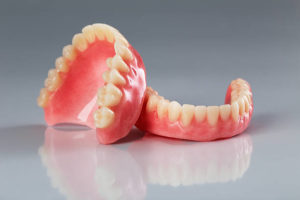 If you’ve been living with several damaged or missing teeth, nothing is more exciting than receiving your new set of teeth. Dentures closely look and feel more realistic than ever before, but don’t expect to chomp into a juicy hamburger right away. It can take a few days to adjust to your new smile. Here’s what you can expect after getting your dentures.
If you’ve been living with several damaged or missing teeth, nothing is more exciting than receiving your new set of teeth. Dentures closely look and feel more realistic than ever before, but don’t expect to chomp into a juicy hamburger right away. It can take a few days to adjust to your new smile. Here’s what you can expect after getting your dentures.
Your First 24 Hours
As soon as you pop your dentures into your mouth, you’ll notice an improvement in your confidence because you won’t have anxiety about the appearance of your smile. You’ll be excited to show off your pearly whites, but don’t forget to follow your dentist’s aftercare instructions, which will include:
- Tooth Extraction Care: If you required tooth extractions before getting your dentures, your dentist will explain how to keep your mouth clean to prevent complications, like dry socket or infections.
- Don’t Remove Your Dentures: Your dentist will instruct you to wear your dentures for 24 hours, even while you’re sleeping. They act as band-aids, which will protect your extraction sites to improve healing.
- Eat Soft Foods: Your mouth may be sore initially and eating can feel awkward. It’s best to eat soft foods for a few days.
Your First 2 Weeks
It’s common for jaw muscles and cheeks to be sore for a week or two because they must adjust to holding your dentures in place. While you get used to your teeth, your dentist will instruct you to:
- Keep Your Mouth Clean: Your dentures can’t get cavities, but you need to clean your dentures daily. Use a soft-bristled toothbrush and non-abrasive toothpaste or mild hand soap or dishwashing liquid. Gently brush your gums, the inside of your cheeks, and your tongue to remove bacteria. Besides brushing, soak your dentures nightly. A denture solution will kill bacteria and prolong the lifespan of your prosthetic.
- Maintain Your Follow-Up Appointments: You may need follow-up appointments for a few weeks to monitor your mouth for any complications, like inflammation.
- Eat Soft Foods: You’ll have to learn to eat with your dentures, which can take time. You can make the transition easier by eating soft foods cut into small pieces.
Maintaining Your New Smile
Your transition period is almost over. You may soon forget you’re wearing your dentures. If your dentures still feel awkward, it’s best to:
- Eat Slowly: Large pieces of food are difficult to chew and can dislodge your dentures. Chew slowly and carefully.
- Talk More: It’s not unusual for your words to sound slurred, but practice makes perfect. Reading out loud and singing can help you get the practice you need.
After a brief learning curve, you won’t think twice before chatting with a friend, enjoying your favorite meal, or smiling for a picture.
About Dr. Molly Makos Fraser
Dr. Fraser achieved her dental degree from the University of Pennsylvania and has regularly continued her education to provide up-to-date services. She has advanced training in many specialties, including endodontics, implant dentistry, and Invisalign. She is a member of the American Dental Association. Request an appointment through our website or call (609) 998-8838.
